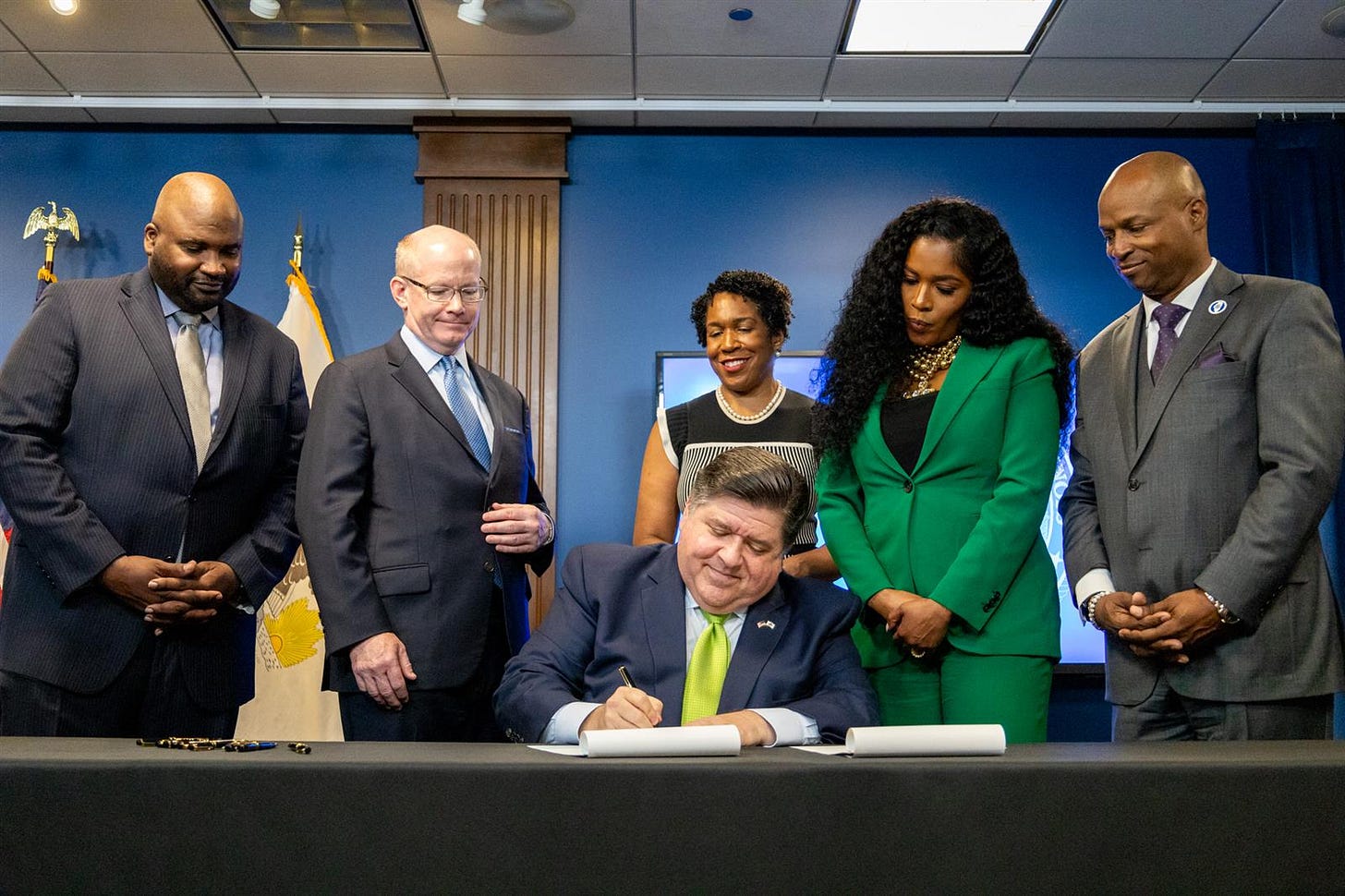Right to Play and Transfers: Big Talk, Small Action
As Illinois passed another tax-heavy budget, amidst the dysfunction, school sports proposals got squeezed
The state of Illinois has very little in common with Texas. Aside from geography—Illinois is a “Lakes” state, and Texas a border one—there is a fundamental difference in philosophy of governance as it pertains to personal freedoms. Texas believes in them; Illinois does not.
Texans have quirky, folksy expressions. They say things like “Don’t bet the ranch on it” or “The porch light’s on, but nobody’s home.”
Say any one of those out loud right now. They’d be apt descriptors of the latest round of Illinois state legislation shenanigans.
Early Sunday morning, assemblypersons put the final touches on the fiscal year budget, one that includes over $55 billion in spending. There are hundreds of millions of dollars in new taxes, and due to the Democrats’ rope-a-doping, a large chunk of the spending got rammed through last minute, with little time for anyone to read the fine print. Supermajorities don’t have to explain their actions. As the old saying goes, elections have consequences.
Thousands of bills were proposed during this latest legislative session, which concluded this past weekend. Hundreds were signed. Two not signed involving kids and sports are notable.
HB 0473 would have amended the state transfer rule, allowing prep athletes to transfer from school to school with fewer restrictions. First proposed on January 9, the bill picked up momentum after spring break when almost two dozen legislators attached their names to the bill. But on April 11, the proposal got kicked back to the committee, where it never came up for a vote.
The more publicized “Right to Play” or HB 3037 allows for less limitations on athletes participating in their school and club teams. This proposal received much media coverage over the winter and spring as assemblypersons held hearings with testimony from exasperated athletes and parents desirous to have their cake and eat it too. As I wrote then, youth sports is a billion-dollar industry with no signs of slowing down. The public/private sports conflict has been brewing for decades, now to the point the state felt compelled to act. The House passed HB 3037 on April 9, forcing the hand of the Illinois High School Association.
Previously opposed to any changes to a rule that prevents athletes from double-dipping (playing school and club in the same season), the IHSA announced in May it had reached an agreement with the state to lift restrictions and allow for two waivers per season.
Statement from IHSA Executive Director Craig Anderson:
The original ‘Right To Play’ bill proposed by State Representative Janet Yang Rohr called for non-school competition to occur without limitations during the high school sport season, which is currently prohibited by IHSA rules. This possibility caused a great deal of concern among IHSA member school coaches and administrators, and to her credit, Representative Yang Rohr heeded that feedback and adjusted accordingly. Working with Representative Yang Rohr and her colleagues in anticipation of the IHSA’s upcoming 2025-26 legislative process, we have received a by-law proposal from a member high school that would allow for a student-athlete to have two opportunities during their high school sports season in which they could compete in non-school competition in that same sport. We believe that this compromise would be much more palatable for IHSA schools from both a safety perspective, as well as for coaches to better be able to navigate their seasons. We look forward to working with our member schools on the details of this by-law proposal and plan to keep Representative Yang Rohr and her colleagues in the loops as it proceeds.
For an organization that likes to promote its non-profit, grassroots civic-mindedness, this is a clear example of political compromise. The IHSA was getting pinched in Springfield, and the juice gained from fighting the state wasn’t worth the squeeze. Play the game or get squashed. Although HB 3037 did not come up for Senate vote this session, Right to Play is a go in some form. Provisions include a January 2026 start date.
But if the state was moving in the direction of Right to Play, which it clearly was as far back as the winter months, there was no reason the legislation couldn’t be activated sooner, or by the 2025 fall high school season.
By comparison, Kentucky’s state legislation first proposed a one-time high school transfer law in February. Next month, the state association will vote on changes to its bylaws. A September vote is likely. Indiana has rapidly moved towards updating its rules and laws around player choice. Sunday was the first day Indiana students could transfer without penalty. While other state athletic associations and assemblies act quickly to update rules and laws to allow for athlete mobility and mirror the current national climate, Illinois remains on the flight deck, waiting for the final inspection report before boarding the plane.
Local government media were breathless in reporting on the May “partnership” agreement between the state legislature and the IHSA. This is for something that hasn’t been finalized, and if eventually passed, wouldn’t take effect until 2026!
You wouldn’t believe what I saw at the grocery store today, Darlene. The doors slide open when you move! I called John Garcia at Channel 7!
On Sunday, Governor Pritzker and the blockheaded lackeys who make up the assembly leadership held a press conference. They celebrated a “budget Illinoisans can be proud of” and touted its “fiscal responsibility.”
When watching the gelatinous Pritzker spew his distorted misrepresentation, I could hear Billy Bob Thornton’s Texas oilman character from the fantastic television show “Landman” say:
“You know what we call con men like him? All hat, no cattle.”
Oh, and if you bet the ranch, it’s likely been repossessed by now.
Have a suggestion for The Kerr Report? Send email to jonjkerr@gmail.com.




